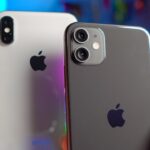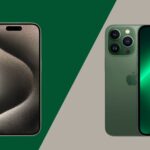When it comes to choosing between the iPhone 12 and iPhone 14, there’s a lot more to consider than just the numbers. Each model has unique strengths, and your best choice depends on what you value most in a smartphone. This article will take you through a detailed comparison, from design to performance and beyond, to help you make an informed decision.
Related: iPhone 8 Plus Compared to iPhone 11
iPhone 12 vs iPhone 14
Choosing between the iPhone 12 and iPhone 14 can be tricky, as both offer excellent features at different prices. This comprehensive guide will compare these iPhones across various aspects, helping you decide which one best suits your needs.
Design and Display:
| Feature | iPhone 12 | iPhone 14 |
|---|---|---|
| Display Size | 6.1 inches | 6.1 inches |
| Display Technology | Super Retina XDR | Super Retina XDR |
| Resolution | 2532 x 1170 | 2532 x 1170 |
| Peak Brightness | 625 nits (typical) | 800 nits (typical) |
The aesthetic differences between the iPhone 12 and iPhone 14 are subtle yet significant. While both models share the sleek, modern design Apple is known for, the iPhone 14 introduces refinements that enhance its appeal. These changes are not just about looking good; they also impact how the device feels in your hand, with the iPhone 14 boasting a more ergonomic design for better grip and comfort.
The newer model also improves display technology and resolution. Both phones feature Super Retina XDR displays, but the iPhone 14 has enhanced brightness and contrast ratios, making for a more vibrant viewing experience. Whether you’re streaming your favorite shows or scrolling through photos, the iPhone 14’s display offers a noticeable upgrade in quality.
Camera:
| Feature | iPhone 12 | iPhone 14 |
|---|---|---|
| Rear Camera System | Dual 12MP | Dual 12MP |
| Main Camera | Wide | Wide |
| Ultra-Wide Camera | Yes | Yes |
| Front Camera | 12MP | 12MP |
| New Camera Features | – | Photonic Engine, Photographic Styles |
The main camera features of the iPhone 12 and iPhone 14 reveal Apple’s continuous efforts to improve photography. The iPhone 12’s dual-camera system was impressive at its launch, providing users with high-quality photos and the flexibility to switch between wide and ultra-wide lenses. However, the iPhone 14 takes it a step further with sensor improvements that enhance low-light performance and color accuracy, making every shot look professional.
The front camera and video capabilities have also evolved. The iPhone 14 boasts better stabilization and higher resolution for selfies and video calls, ensuring you look your best in any lighting condition. Additionally, the newer model introduces more advanced video features, like Cinematic mode, which brings a depth-of-field effect to your videos, making them look more cinematic.
Performance and Battery Life:
| Feature | iPhone 12 | iPhone 14 |
|---|---|---|
| Processor | A14 Bionic | A15 Bionic |
| RAM | 4GB | 4GB |
| Battery Life | Up to 17 hours video playback | Up to 20 hours video playback |
A comparison of the iPhone’s chipset and processing power highlights the technological leaps made between generations. The iPhone 12’s A14 Bionic chip already offered fast performance and efficient power management. Yet, the iPhone 14’s A15 Bionic chip surpasses it with faster processing speeds and more efficient energy use, ensuring smoother multitasking and longer battery life.
Battery capacity and charging technology have seen incremental improvements. While both models support fast charging and wireless charging, the iPhone 14 benefits from a slightly larger battery and optimized software that extends battery life. This means you can spend more time using your phone and less time tethered to an outlet.
Software:
Operating system comparison is essential, as software defines the user experience. Both the iPhone 12 and iPhone 14 run on iOS, but the iPhone 14 ships with the latest version out of the box, offering new features and improvements in privacy, security, and usability. Of course, the iPhone 12 can be updated to the latest iOS version, ensuring both models provide a seamless and user-friendly experience.
Unique software features in the iPhone 14 include augmented reality (AR) and health monitoring advancements. Apple continues integrating more sophisticated AR capabilities into its newer models, and the iPhone 14 is no exception. Additionally, health features like the enhanced Emergency SOS via satellite can be a deciding factor for users who prioritize safety and wellness.
Other Features:
| Feature | iPhone 12 | iPhone 14 |
|---|---|---|
| Storage Options | 64GB, 128GB, 256GB | 64GB, 128GB, 256GB, 512GB |
| 5G Connectivity | Yes | Yes |
| MagSafe | Yes | Yes |
Connectivity options on both devices ensure you’re always connected. The iPhone 12 introduced 5G connectivity, a significant upgrade from previous models. The iPhone 14 builds on this, offering more bands and improved 5G performance for faster download and upload speeds, ensuring that you’re getting the most out of your network.
Additional enhancements in the iPhone 14 include improved durability and environmental resistance. Both models are designed to withstand the rigors of daily use, but the iPhone 14 features more robust materials, making it more resistant to scratches and drops. Furthermore, it meets a higher IP68 water and dust resistance standard, giving users added peace of mind.
Pros & Cons:
iPhone 12:
Pros:
- More affordable
- Excellent camera system
- Sleek design
Cons:
- Lower peak brightness display
- Slower A14 Bionic chip
- Less storage options
iPhone 14:
Pros:
- Brighter display
- Faster A15 Bionic chip
- More storage options
- Improved camera features
Cons:
- More expensive
Which Should You Buy?
It remains a great choice if you prioritize affordability and are content with the iPhone 12’s capabilities. However, if you desire the latest advancements in performance, camera technology, and display brightness, the iPhone 14 is the better option.
Who Should Upgrade?
iPhone 11 or older users will experience a significant performance and feature jump by upgrading to either the iPhone 12 or 14. Upgrading from the iPhone 12 to 14 is less compelling unless you need a brighter display, faster chip, or additional storage option.
Who Can Stick With the iPhone 12?
iPhone 12 users who are satisfied with their phone’s performance and features can hold off on upgrading to the iPhone 14 unless they require the specific improvements mentioned earlier.
Final Thoughts:
Both the iPhone 12 and iPhone 14 are excellent smartphones. The best choice depends on your individual needs and budget. Carefully consider the factors discussed in this guide to make an informed decision that aligns with your priorities.
Related: iPhone x Compared to iPhone 11
iPhone 12 vs iPhone 14 FAQs:
Which iPhone is newer, the iPhone 12 or 14?
The iPhone 14 is the newer model.
Which iPhone is more expensive, the iPhone 12 or 14?
The iPhone 14 is generally more expensive than the iPhone 12.
Do both iPhones have the same screen size?
Yes, both the iPhone 12 and 14 have a 6.1-inch display.
Which iPhone has a brighter screen?
The iPhone 14 features a brighter display with a peak brightness of 800 nits compared to the iPhone 12’s 625 nits.
Do both iPhones have the same camera system?
Both share a similar dual 12MP rear camera system, but the iPhone 14 introduces the Photonic Engine and Photographic Styles for enhanced image processing and creative control.
Performance and Battery Life:
Which iPhone is faster?
The iPhone 14 boasts the faster A15 Bionic chip compared to the A14 Bionic chip in the iPhone 12.
Which iPhone has better battery life?
The iPhone 14 offers slightly longer battery life, with up to 20 hours of video playback, compared to the iPhone 12’s 17 hours.
Should I upgrade from iPhone 11 to iPhone 12 or 14?
Upgrading to either iPhone 12 or 14 will be a significant improvement from the iPhone 11.
Should I upgrade from iPhone 12 to iPhone 14?
Upgrading from iPhone 12 to 14 is optional and depends on your needs. Consider if the brighter display, faster chip, or extra storage in the iPhone 14 are important to you.





